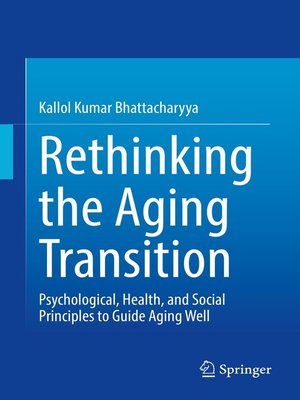Rethinking the Aging Transition
ebook ∣ Psychological, Health, and Social Principles to Guide Aging Well · Social Sciences
By Kallol Kumar Bhattacharyya

Sign up to save your library
With an OverDrive account, you can save your favorite libraries for at-a-glance information about availability. Find out more about OverDrive accounts.
Find this title in Libby, the library reading app by OverDrive.



Search for a digital library with this title
Title found at these libraries:
| Library Name | Distance |
|---|---|
| Loading... |
The transitional phase from pre-older adult to older adult affects the wellbeing of the concerned person economically, physically, and psychologically. This book is a description of the aging transition and discusses various psychological, health, and social challenges faced by older adults globally. It also offers a comparative study on the lifestyles of older adults in India and the United States.
Although there is no consensus yet on an all-encompassing theory of aging, this book centers on various theories related to aging processes in an effort to advance discussion on different aspects of aging. Various theoretical formulations, such as person-centered, Hinduism, biopsychosocial, and positive psychology, guided the author to address the topics covered in this volume.Aging and Physicians Aging and Retirement Aging, Caregiving, and COVID-19 Aging and Diversity Aging and Longevity Aging, DiseasePrevention, and Technology Aging and Spirituality
Through the chapters, the author builds an understanding of the fundamental relation of aging with various health and socioeconomic factors, and also emphasizes a person-centered, holistic approach that values personal autonomy, choice, comfort, dignity, and purposeful living to support aging well.
Rethinking the Aging Transition: Psychological, Health, and Social Principles to Guide Aging Well has academic value from a multicultural perspective that would be of benefit to graduate and undergraduate students in gerontology and other disciplines that study aging and older adult populations. With the main aim of raising awareness, this book is an important resource for a diverse group of populations globally, including clinical and non-clinical caregivers, other health(care) professionals, and policy-makers.
Although there is no consensus yet on an all-encompassing theory of aging, this book centers on various theories related to aging processes in an effort to advance discussion on different aspects of aging. Various theoretical formulations, such as person-centered, Hinduism, biopsychosocial, and positive psychology, guided the author to address the topics covered in this volume.
Rethinking the Aging Transition: Psychological, Health, and Social Principles to Guide Aging Well has academic value from a multicultural perspective that would be of benefit to graduate and undergraduate students in gerontology and other disciplines that study aging and older adult populations. With the main aim of raising awareness, this book is an important resource for a diverse group of populations globally, including clinical and non-clinical caregivers, other health(care) professionals, and policy-makers.







